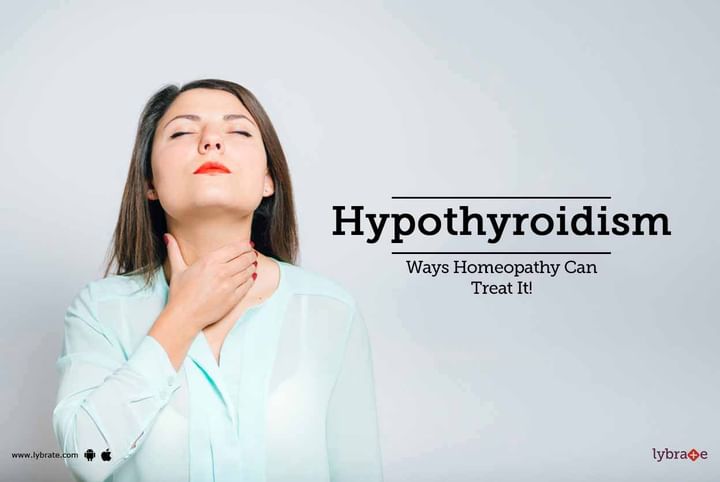Hypothyroidism - Ways Homeopathy Can Treat It!
Thyroid is a small butterfly-shaped gland situated just below your Adam’s apple, a little above where the two collar bones meet. Its one of the essential endocrine or ductless glands; its function being secretion of thyroid hormones T3 and T4. These hormones regulate the metabolism of the body, i.e. define the way your body uses energy. It also controls functions like how your heart beats or your digestive system works.
One cannot feel a normal thyroid. It is only when the thyroid gland gets enlarged that it can be felt.
Any dysfunction of the gland brings alterations in the levels of circulating thyroid hormones. This can affect a person’s metabolism and cause fluctuations in body weight, mood, temperature regulation, etc.
Hypothyroidism occurs when your body doesn’t produce enough of thyroid hormones. It can be -
1. Primary Hypothyroidism: Where the deficiency of thyroid hormones is due to direct impairment of the thyroid gland’s function.
2. Secondary Hypothyroidism: Where the deficiency of thyroid hormones is due to inadequate stimulation of the thyroid gland by the pituitary gland - the master gland of the body - that secretes TSH (thyroid stimulating hormone) - the most important internal factor controlling thyroid function. If the pituitary is damaged and cannot make TSH, the thyroid stops working.
Also called under-active thyroid, Hypothyroidism affects women more often than men. It commonly affects people over the age of 60 but can begin at any age. Hypothyroidism may be discovered through a routine blood test or after the symptoms begin.
Causes of Hypothyroidism
-
An autoimmune disease: Hashimoto’s thyroiditis
Your immune system is designed to protect your body’s cells against invading bacteria and viruses. When unknown bacteria or viruses enter your body, the immune system responds by sending out fighter cells to destroy the foreign cells.
Sometimes, your body confuses normal, healthy cells for invading cells and starts attacking them. This is called an autoimmune response. If it isn’t regulated or treated, the immune system can attack healthy tissues causing serious medical issues.
In areas where Iodine is adequate, Hashimoto’s thyroiditis is the most common cause of hypothyroidism. It is an autoimmune condition and the most common cause of an underactive thyroid. This disease attacks your thyroid gland and causes chronic thyroid inflammation. The inflammation can reduce thyroid function. It’s common to find multiple family members with this same condition.
Other causes can be:
-
Viral infections or other respiratory disorders
-
Certain medicines like lithium used to treat certain psychiatric disorders
-
Radiation therapy for cancers
-
Treating hyperthyroidism with anti-thyroid medicine can sometimes cause a shift from hyperthyroidism to hypothyroidism
-
An under-active thyroid gland by birth
-
During pregnancy in a few cases
The most common signs and symptoms of hypothyroidism include:
-
Weight gain with a puffy face
-
Weakness
-
Dry, rough and pale skin
-
Decreased sweating
-
Dry, thinning hair accompanied with lots of hair fall
-
Muscle stiffness, aches, and cramps
-
Pain and stiffness in joints
-
Cold intolerance
-
Irritability
-
Slowed heart rate
-
Elevated blood cholesterol
-
Abnormal menstrual cycles or fertility issues
-
Decreased libido
Treatment
Hypothyroidism is best treated by supplementing your low hormone levels with artificial varieties. These hormones will replace what your body isn’t producing on its own and help return your body’s functions to normal.
Once you start treatment, it takes several weeks before you begin feeling relief. You’ll require follow-up blood tests to monitor your progress. You and your doctor will work together to find a dose and a treatment plan that best addresses your symptoms. This can take some time.
In most cases, people with hypothyroidism must remain on this medication for their entire lives. However, it’s unlikely that you’ll continue to take the same dosage. Your blood levels of TSH, T3, and T4 determine your hormonal dosage.
To make sure your medication is still working properly, you should get your thyroid function test done yearly.
Homeopathic Treatment for Hypothyroidism
Here's a list of homeopathic medicines that are helpful in this condition:
-
Calcarea Carbonica
-
Sepia Officinalis
-
Lycopodium Clavatum
-
Graphites
-
Nux Vomica
-
Iodum
-
Thymusinum esp. for stunted growth in children due to an under-active thyroid
-
Bromium treats goiter
-
Lapis albus for hyperthyroidism and goiter
-
Natrum muriaticum for an underactive gland
However, these are just the names. Choosing or prescribing the right medicine depends on the cause of the disease and its effects.
Homeopathic medicines have been known to correct the imbalance in the thyroid hormones in a very gentle and subtle manner. The remedies are purely natural and have no side effects. Their intake causes an improvement in the functioning of the thyroid gland rather than providing just a daily supply of artificial hormones.
Once an optimum level of thyroid function is achieved, the medicines can be gradually tapered off so that you can live a disease-free and a medicine-free life.
A detailed consultation with your homeopath is essential to zero-in on the remedy that will work best for you, based on your signs and symptoms.



+1.svg)
